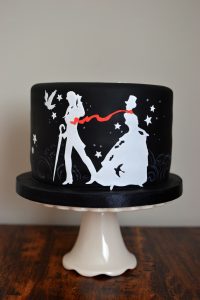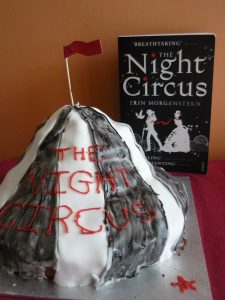I think The Night Circus by Erin Morgenstern is like a splendid cake: A fluffy morsel that feeds the imagination, but not without its flaws.
To begin, this cake used an excellent recipe. The story of the novel’s creation using the novel-writing month piqued my interest. As an audio book, it is fantastically formatted; with each chapter being easily accessible and helpful rewind and speed-up features. I really enjoyed how I could listen on my PC a home, and the bookmark would remember where I stopped when I resumed play on my iPhone.
I think the imagery used throughout the book is the wonderful buttercream frosting that decorates the cake. Vivid descriptions of the clock, the ice garden, and the La’fev estate among other locales painted lucid pictures in my head, building my attachment to the story. Additionally, the descriptions of food and smells in the circus absorbed me into the book in a new way. I never considered the literary value of food before, but the popcorn, coffee, and caramel apples enamored me. I often found myself envying the midnight dinners of the original conspirators. After reading The Night Circus, I plan to explore food writing and food in literature a bit more.
The characters are hit-and-miss for me. Alexander and Hector have an air of mystery around them that makes them enticing to me as a reader. The twins and Bailey are sweet, and their childhood whimsy play along with the circus setting quite well. However, Celia and Marco could have used more development considering they are the main characters. Celia’s anger seemed like it was going to be a deciding factor in the game after reading the chapter where she first wears the ring that binds her, but it seemingly disappeared from the novel before having impact. Marco seemed to lack major development, although I did enjoy the dark bit about how he had been wiping Chandrish’s memory occasionally. As such, these characters are like bright candles: some shine brilliantly while others distract from an otherwise exquisite dessert.
The real question is how does the cake taste? Honestly, it is a bit vanilla. The “love at first sight” and “together forever” tropes that pepper Celia and Marco’s relationship come off as bland. The competition that structures most of the story does not have much flavor. A tablespoon of something sugary, like checkpoints during the competition or more backstory, would have made the competition better for me. Finally, while I like the idea of the circus continuing into modern times, the ending has not left me feeling full.
Vanilla does not necessarily mean bad, just very familiar. This story does not seem to break new ground but is pleasant to listen to (or read, if that is more your thing). The imagery and help prop up the occasionally flimsy characters and plot.
Which cake is it? You decide.


